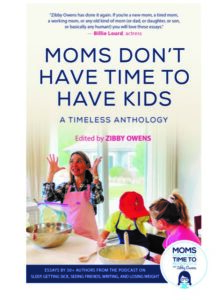Click, Click, Click Through My Mind by Zibby Owens (Book Excerpt)
 At first, I just couldn’t find the right words. I would open my mouth to speak and my brain would spin in circles like that unwanted rainbow swirl on a frozen computer.
At first, I just couldn’t find the right words. I would open my mouth to speak and my brain would spin in circles like that unwanted rainbow swirl on a frozen computer.
“It’s in the garbage,” I would answer, when asked the whereabouts of something in the garage.
People’s names? Forget it. I would pass women about my age, then my early 30s, on the street and they would stop and say, “Zibby!” We would chitchat and part ways, all the while I couldn’t remember who they were or how I knew them.
I even started getting lost. On the way back from running to a drugstore down the block, I suddenly stopped on the street I’d traversed a million times and couldn’t remember where I was or which direction would take me home. I just froze on that tree-lined New York City street, cars whizzing past, clutching a white plastic shopping bag, and knew that the cognitive impairment I’d noticed was getting worse. I called my (now ex) husband and said I felt like I was losing my mind. He stayed on the phone until I could get my bearings.
Admittedly, it was a stressful time. I had 3-1/2-year-old twins in the “terrible threes” who didn’t sleep. At all. We were in a temporary rental apartment with none of our creature comforts while our home was being renovated. The loving nanny on whom I depended, whom I loved like a best friend, whose former boyfriend I’d helped catch having an affair, suddenly left our family—and New York—after a cancer diagnosis. (She is now fine, but never came back to work.) I wasn’t getting along with my husband. I was out of sorts, depressed, a bit lost emotionally from not working after decades of academic and professional rigor.
“I think I’m losing my mind,” I confessed to some fellow moms while sitting on plastic folding chairs, watching an indoor Kids in Sports gym class through glass doors. “I can’t even form proper sentences anymore.”
“Mom brain,” one friend responded, waving her hand dismissively.
“Me too,” another said.
“Totally,” another added.
“It happens to everyone,” a wiser mom with older kids advised.
I tried not to worry. But eventually I consulted a doctor who referred me to a neurologist. Suddenly, I was sitting in a wood-paneled waiting room with white-haired octogenarians who shuffled into the exam rooms ahead of me. What was I doing? The neurologist kindly examined me and then ordered a bunch of tests. I went from kids’ music classes to having little plastic nodes glued onto my head to assess my brain function; reading Goodnight Moon to sitting in hospital hallways waiting for full-body MRIs. I even endured a ten-hour, multi-step neuro-psychological assessment.
And I did it all alone, accompanied only by fear. My mom friends said it was par for the course. But I just knew something was off.
As I paced in the rental apartment one afternoon trying unsuccessfully to get the kids to take naps, the doctor called.
“We found some abnormalities on the MRI,” he said quickly. “Looks like a cyst of some type on your brain. Probably nothing to worry about. Not sure if it’s causing the memory problems. Don’t think it’s malignant. Probably benign, but I’ll get back to you when I know more.”
“Sorry, wait,” I said, grabbing a pen and paper. “Could you say that again?”
I had what was soon identified as a colloid cyst (5 mm.) in the third ventricle of my brain. I’d had bouts with headaches years earlier so I had an older MRI to compare this one to. The neurologist read the report and decided the tumor had been growing rapidly. Brain surgery was quickly on the table.
I told my family and some close girlfriends, who all helped me get other opinions. I sent my MRI results to hospitals all over the country. Every single surgeon I spoke to recommended immediate surgery as a preventative measure. If I waited, the tumor could maintain its quick rate of growth and start having a real, negative impact.
Suddenly I was juggling whether a surgeon should go in through the top of my skull or if they could do it non-invasively. Meanwhile, I was managing the move into our new home, the ever-present needs of two wildly different twins, and the rest of life. And I still couldn’t keep anything straight in my head. I overate to dull the feelings, getting to the point where all I could wear was leggings with long, billowy sweaters, which I wrapped tightly around me.
On my sixth opinion, one I almost didn’t even get, I met a white-haired, spry neurologist who decided to analyze the hundreds of different slides and slices from my original MRIs years earlier, which hadn’t shown a mass at all. Unlike the other doctors, he didn’t take the radiologist’s report at face value. I sat across the giant wooden desk from him, sun pouring in through the window, fractured by white, slatted blinds, as he leaned forward toward his computer, slowly studying the images of my brain, pre-tumor. I couldn’t even breathe. I just watched him click, click, click through my mind.
And then he stopped clicking. “A-ha! There it is!” he exclaimed. He turned around the screen and, in the shadows of the images, there was the same “new” tumor, now not new at all.
“It’s probably been there your whole life,” he said, studying the image again and toggling between two slides that clearly showed it. “It doesn’t need to come out. It hasn’t even grown. Same size. Probably just a benign colloid cyst. Very common.”
“You’re 100% sure?” I asked.
“100%. You can see it yourself,” he said.
And I could.
Had I not seen this doctor, the last stop on my multi-opinion tour, I would’ve had a variety of eager-to-operate surgeons claw into my head, perhaps destroying what made me me.
“What about my memory loss? My cognitive impairment?”
He looked at me with sad, sympathetic eyes. Really seeing me.
“It’s probably stress and sleep-deprivation. Get some rest. You’re going to be fine.”
I could barely stand up, flooded by relief.
It’s ten years later, and the cyst is still there. It hasn’t grown as my annual MRIs show—when I remember to get them. I still lose my ability to retrieve words when I’m extremely tired. Sometimes I don’t recognize friends on the street who clearly know me. I occasionally get lost and disoriented, but my neuropsych test results reflected my already-known “impaired” visual-spatial abilities, so compromised that I can literally get lost in my own neighborhood.
My twins are now teenagers and sleep later than me, although I ended up having two more children who still sneak in at night. I got divorced and then remarried. The home we renovated was sold years ago. My “new” husband comes with me to every single doctor’s appointment and holds my hand in the waiting room. I never even have to ask. My brain remains untouched, thanks to that one doctor who took a little extra time for me. If only I could remember his name to thank him.
 Zibby Owens is the creator and host of award-winning podcast “Moms Don’t Have Time to Read Books.” She is a regular contributor to Good Morning America online and the Washington Post, and her work has appeared in Real Simple, Parents, Marie Claire, Redbook, and many other publications. She lives in New York with her husband, Kyle, and her four children.
Zibby Owens is the creator and host of award-winning podcast “Moms Don’t Have Time to Read Books.” She is a regular contributor to Good Morning America online and the Washington Post, and her work has appeared in Real Simple, Parents, Marie Claire, Redbook, and many other publications. She lives in New York with her husband, Kyle, and her four children.
Excerpted with permission from Moms Don’t Have Time To Have Kids, published by Skyhorse Press (2021).
Photo credit: Emily Young
Tags: adoption, anthology book, author, family, having children, moms don't have time to have kids, motherhood, parentng, pregnancy, raising kids, zibby owens
















One Response to “ Click, Click, Click Through My Mind by Zibby Owens (Book Excerpt)”
Heartfelt story. I am so glad you saw the final doctor. Thank you for sharing.
By Marina Topsis on Dec 7, 2021